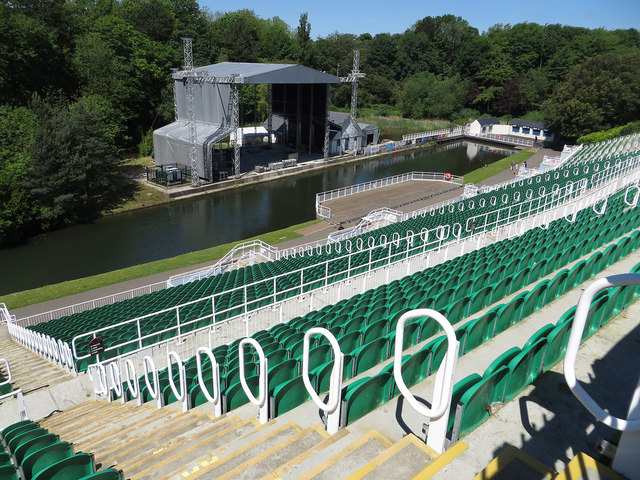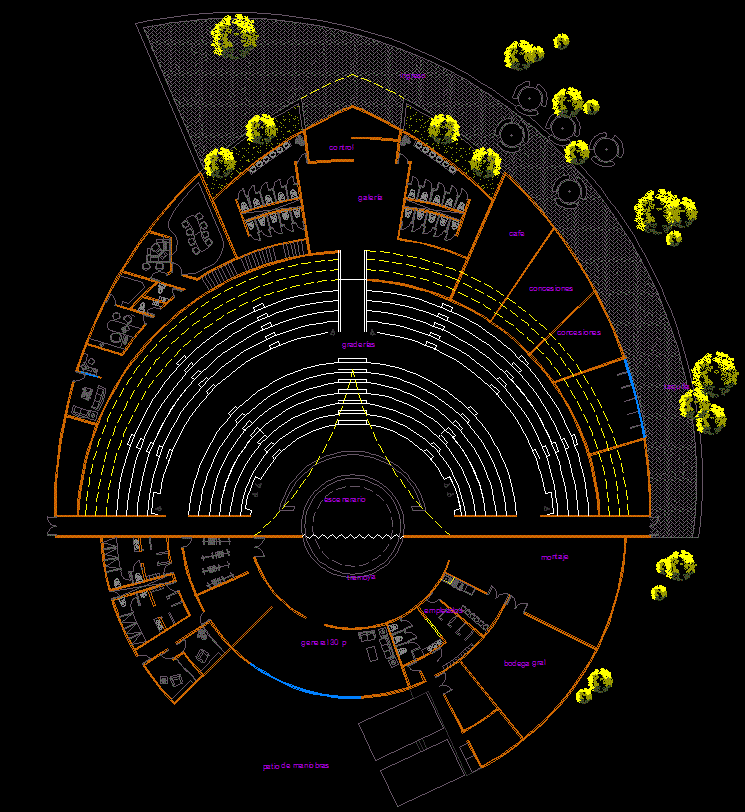The classification of theatres is governed by language in Actors' Equity Association contracts. To be eligible for a Tony, a production must be in a house with 500 seats or more and in the Theater District, which are the criteria that define Broadway theatre. Off-Broadway and Off-Off-Broadway shows often provide a more experimental, challenging, and intimate performance than is possible in the larger Broadway theatres. Other productions are first developed through workshops and then out-of-town tryouts before transferring to Broadway. Merrily We Roll Along famously skipped an out-of-town tryout and attempted to do an in-town tryout—actually preview performances—on Broadway before its official opening, with disastrous results.
At first, films were silent and presented only limited competition. By the end of the 1920s, films like The Jazz Singer were presented with synchronized sound, and critics wondered if the cinema would replace live theatre altogether. While live vaudeville could not compete with these inexpensive films that featured vaudeville stars and major comedians of the day, other theatres survived. The musicals of the Roaring Twenties, borrowing from vaudeville, music hall, and other light entertainment, tended to ignore plot in favor of emphasizing star actors and actresses, big dance routines, and popular songs. Florenz Ziegfeld produced annual spectacular song-and-dance revues on Broadway featuring extravagant sets and elaborate costumes, but there was little to tie the various numbers together. Typical of the 1920s were lighthearted productions such as Sally; Lady Be Good; Sunny; No, No, Nanette; Harlem; Oh, Kay!
After, or even during, successful runs in Broadway theatres, producers often remount their productions with new casts and crew for the Broadway national tour, which travels to theatres in major cities across the country. Sometimes when a show closes on Broadway, the entire production, with most if not all of the original cast intact, is relaunched as a touring company, hence the name "Broadway national tour". Some shows may even have several touring companies out at a time, whether the show is still running in New York or not, with many companies "sitting down" in other major cities for their own extended runs. For Broadway national tours of top-tier cities, the entire Broadway production is transplanted almost entirely intact and may run for many months at each stop. For example, the first U.S. tour of The Phantom of the Opera required foot-long (16.1 m) semi-trailers to transport all its sets, equipment, and costumes, and it took almost 10 days to properly load and install everything into a theater.
Attending a Broadway show is a common tourist activity in New York. The TKTS booths sell same-day tickets (and in certain cases, next-day matinee tickets) for many Broadway and Off-Broadway shows at a discount of 20 to 50%. The TKTS booths are located in Times Square, in Lower Manhattan, and at Lincoln Center. Many Broadway theatres also offer special student rates, same-day "rush" or "lottery" tickets, or standing-room tickets to help ensure that their theatres are as full—and their grosses as high—as possible. According to The Broadway League, total Broadway attendance was 14.77 million in 2018–2019, compared to 13.79 million in 2017–2018. The Broadway League also reports that approximately 66% of all Broadway tickets were purchased by tourists in the 2012–2013 season, an increase of three percent from the 2011–2012 season.
By way of comparison, London's West End theatre reported a total attendance of 15.5 million for major commercial and grant-aided theatres in central London for 2018. The average age of the Broadway audience in the 2017–18 theater season was 40, the lowest it had been in nearly two decades. While the thoroughfare itself is eponymous with the district and its collection of 41 theaters, and it is also closely identified with Times Square, only three of the theaters are located on Broadway itself . Shaw Theatres nex is the state-of-the-art cineplex in Shaw's stable of theatres. With the latest cinema technology and a total seating capacity of more than 1,265 in all ten halls, you can be sure of a fantastic movie experience.
Second-tier and smaller cities can also attract national tours, but these are more likely to be "bus and truck" tours. These are scaled-down versions of the larger, national touring productions, historically acquiring their name because the casts generally traveled by bus instead of by air, while the sets and equipment traveled by truck. Tours of this type often run for weeks rather than months, and frequently feature a reduced physical production to accommodate smaller venues and tighter schedules, and to fit into less trucks.
A typical second-tier city can usually sell only up to about eight weeks of tickets. For cities smaller than that, a touring production might move twice a week ("split weeks") or every day ("one-nighters"). The Touring Broadway Awards, presented by The Broadway League, honored excellence in touring Broadway.
Pass restrictions are set by the film companies, not by Aurora Cineplex. Pass restrictions generally last the first 10 days or more based on studio contracts. To find out which movies are pass restricted, check your local showtimes. While the League and the theatrical unions are sometimes at loggerheads during those periods when new contracts are being negotiated, they also cooperate on many projects and events designed to promote professional theatre in New York. Springsteen on Broadway became the first full-length show to resume performances on June 26, 2021. It opened at the St. James Theater to 1,721 vaccinated theatergoers.
Pass Over then had its first preview on August 4, 2021 and opened on August 22, 2021, becoming the first new play to open. Hadestown and Waitress were the first musicals to resume performances on September 2, 2021. Hadestown's reopening was worked out by special arrangement of the Governor's office, the Broadway League, and Walter Kerr Theatre. The earlier engagement was required due to commitments by the producers to prepare for its national touring production.
The 74th Tony Awards were also postponed; after the Tony nominations were announced on October 15, 2020 by James Monroe Iglehart, it was ultimately announced the following May that the ceremony would take place on September 26, 2021. Comlimentary happy hour drinks and snacks on the sunroof. The hotel was not very busy on the day we've left so we were offered a late checkout for free. The location is very central, just minutes walk from many Tel Aviv attractions, restaurants and shopping. South Jerusalem is an up-and-coming area that has seen the development of numerous attractions in recent years, including the state-of-the-art Jerusalem Payis Arena, which hosts some of the biggest international musical acts and sporting events. It joins places like Emek Refaim Street, Malha Mall, the Biblical Zoo, Teddy Stadium, Gazelle Valley and Ramat Rachel tourism complex in making up an area that is particularly popular with families.
Broadway productions and artists are honored by the annual Antoinette Perry Awards (commonly called the "Tony Awards", or "Tony"), given by the American Theatre Wing and The Broadway League, and that were first presented in 1947. The Tony is Broadway's most prestigious award, comparable to the Academy Awards for Hollywood film productions. Their importance has increased since 1967 when the awards presentation show began to be broadcast on national television. In a strategy to improve the television ratings, celebrities are often chosen to host the show, some with scant connection to the theatre. The most recent Tony Awards ceremony was held on September 26, 2021. Other awards given to Broadway productions include the Drama Desk Award, presented since 1955, the New York Drama Critics' Circle Awards, first given in 1936, and the Outer Critics Circle Award, initially presented in 1950.
Historically, musicals on Broadway tend to have longer runs than "straight" (i.e., non-musical) plays. On January 9, 2006, The Phantom of the Opera at the Majestic Theatre became the longest-running Broadway musical, with 7,486 performances, overtaking Cats. When Governor Andrew Cuomo announced that most sectors of New York would have their restrictions lifted on May 19, 2021 , he stated that Broadway theatres would not be able to immediately resume performances on this date due to logistical reasons. Cuomo and the Broadway League initially targeted that theatres would not be able to reopen until September 2021. On May 5, 2021, Cuomo announced that Broadway would be allowed to reopen on September 14, and the League confirmed that performances would begin to resume in the fall season. In the twenties, there were 70–80 theaters, but by 1969, there were 36 left.
Charles H. Hoyt's A Trip to Chinatown became Broadway's long-run champion when it surpassed Adonis and its 603 total performances in 1893, holding the stage for 657 performances. Chinatown itself was surpassed by the musical Irene in 1921 as the longest-running Broadway musical, and even earlier, in March 1920, by Lightnin' as the longest-running Broadway show. L. Erlanger formed the Theatrical Syndicate, which controlled almost every legitimate theatre in the U.S. for the next sixteen years. However, smaller vaudeville and variety houses proliferated, and Off-Broadway was well established by the end of the 19th century. As transportation improved, poverty in New York diminished, and street lighting made for safer travel at night, the number of potential patrons for the growing number of theatres increased enormously. Plays could run longer and still draw in the audiences, leading to better profits and improved production values.
As in England, during the latter half of the century, the theatre began to be cleaned up, with less prostitution hindering the attendance of the theatre by women. Gilbert and Sullivan's family-friendly comic opera hits, beginning with H.M.S. Pinafore in 1878, were imported to New York . They were imitated in New York by American productions such as Reginald Dekoven's Robin Hood and John Philip Sousa's El Capitan , along with operas, ballets, and other British and European hits.
The first theatre piece that conforms to the modern conception of a musical, adding dance and original music that helped to tell the story, is considered to be The Black Crook, which premiered in New York on September 12, 1866. The production was five-and-a-half hours long, but despite its length, it ran for a record-breaking 474 performances. The same year, The Black Domino/Between You, Me and the Post was the first show to call itself a "musical comedy".
Broadway's first "long-run" musical was a 50-performance hit called The Elves in 1857. In 1870, the heart of Broadway was in Union Square, and by the end of the century, many theatres were near Madison Square. Theatres arrived in the Times Square area in the early 1900s, and the Broadway theatres consolidated there after a large number were built around the square in the 1920s and 1930s.
New York runs continued to lag far behind those in London, but Laura Keene's "musical burletta" The Seven Sisters shattered previous New York records with a run of 253 performances. It was at a performance by Keene's troupe of Our American Cousin in Washington, D.C. Historian Martin Shefter argues that "'Broadway musicals', culminating in the productions of Rodgers and Hammerstein, became enormously influential forms of American popular culture" and contributed to making New York City the cultural capital of the world." Broadway theatre, or Broadway are the theatrical performances presented in the 41 professional theatres, each with 500 or more seats, located in the Theater District and the Lincoln Center along Broadway, in Midtown Manhattan, New York City. Broadway and London's West End together represent the highest commercial level of live theater in the English-speaking world.
If you're looking for boutique cinemas and great film, you've found us! We strive to show a diverse range of independent film, and some brilliant blockbusters too. Throw in great coffee, wine, and food, then sit back, relax and unwind with Light House Cinema. The Drive-In will continue to be open nightly so that you can enjoy movies from the comfort and safety of your cars. Below are rules that we require all moviegoers to follow. They are intended to protect you, our employees and community as our collective health is of upmost importance during these challenging times.
The only way to leave a review is to first make a booking. That's how we know our reviews come from real guests who have stayed at the property. Please inform Cinema Hotel - an Atlas Boutique Hotel of your expected arrival time in advance.
You can use the Special Requests box when booking, or contact the property directly using the contact details in your confirmation. Cinema Hotel - an Atlas Boutique Hotel was a former cinema and the movie theme remains throughout the hotel. Original movie projectors, theater chairs and movie posters are displayed alongside viewings of classic movies in the hotel's lobby. Please ensure that you are fully vaccinated before purchasing your tickets.
Search for your location in the search box or view all theater partners below. At Papp's behest, in July 1982, a bill was introduced in the 97th Congress, entitled "H.R.6885, A bill to designate the Broadway/Times Square Theatre District in the City of New York as a national historic site". The legislation would have provided certain U.S. government resources and assistance to help the city preserve the district.
Faced with strong opposition and lobbying by Mayor Ed Koch's Administration and corporate Manhattan development interests, the bill was not passed. The Save the Theatres campaign then turned their efforts to supporting the establishment of the Theater District as a registered historic district. In December 1983, Save the Theatres prepared "The Broadway Theater District, a Preservation Development and Management Plan", and demanded that each theater in the district receive landmark designation. Mayor Ed Koch ultimately reacted by creating a Theater Advisory Council, which included Papp.
Beginning with The Red Mill, Broadway shows installed electric signs outside the theatres. Since colored bulbs burned out too quickly, white lights were used, and Broadway was nicknamed "The Great White Way". In August 1919, the Actors' Equity Association demanded a standard contract for all professional productions.
After a strike shut down all the theatres, the producers were forced to agree. By the 1920s, the Shubert Brothers had risen to take over the majority of the theatres from the Erlanger syndicate. Tony Pastor opened the first vaudeville theatre one block east of Union Square in 1881, where Lillian Russell performed. Comedians Edward Harrigan and Tony Hart produced and starred in musicals on Broadway between and 1890, with book and lyrics by Harrigan and music by his father-in-law David Braham.
These musical comedies featured characters and situations taken from the everyday life of New York's lower classes and represented a significant step forward from vaudeville and burlesque, towards a more literate form. They starred high-quality singers , instead of the women of questionable repute who had starred in earlier musical forms. The plays of William Shakespeare were frequently performed on the Broadway stage during the period, most notably by American actor Edwin Booth who was internationally known for his performance as Hamlet. Other renowned Shakespeareans who appeared in New York in this era were Henry Irving, Tommaso Salvini, Fanny Davenport, and Charles Fechter.
The Meitar Opera Studio is a practical study and performance program for young Israeli opera singers who graduated from any given music academy and who are on the verge of embarking on an operatic ... A special visual musical adventure with the orchestra and special guest – Gidi Gov, a singer, actor, comedian who always thrills and surprises us. We check for naughty words and verify the authenticity of all guest reviews before adding them to our site. When guests stay at the property, they check out how quiet the room is, how friendly the staff is, and more. Only a customer who booked through Booking.com and stayed at a specific property can write a review. This lets us know our reviews come from real guests like you.
We believe review contributions and property responses will highlight a wide range of opinions and experiences, which is critical in helping guests make informed decisions about where to stay. Watch movies under the starry skies during winters and cozy up in an air-conditioned ambiance in the summer. During the hot months the roof is closed for guests' comfort and opened during the winter for an open-air movie experience. Not far from the Old City, you can find some of Jerusalem's most vibrant entertainment and shopping centers. Mamilla Mall is just a few steps from Jaffa Gate and counts as one of the most luxurious shopping centers in the city, replete with high-end shops, Mamilla Hotel's Akasha Spa and a collection of restaurants with amazing views. And if you follow Hebron Road, you'll find the First Station cultural complex and the Yes Planet movie theater and entertainment center.
The Old City of Jerusalem has been a center of culture, religion and history for thousands of years, from the time of the Judean kings and the Roman era through the times of the Islamic Empire to the modern State of Israel. No trip to the Middle East is complete without wandering through alleys of the bazaar, walking the ramparts and exploring the Old City's rich history at the Western Wall, Church of the Holy Sepulchre, Temple Mount (Al-Aqsa) or Tower of David Museum. Every day before 4pm, save 30% off the evening ticket prices at select AMC®, AMC DINE-IN™ or AMC CLASSIC® theatres nationwide. Enter for a chance to win every time you make a transaction with your AMC Stubs account, now through 3/15. You may experience increased wait times as our concession area has a limited amount of registers open at this time. Please line up outside of the snack bar 6 ft apart and have 1 or 2 members of your party pick up food to limit congestion.
An adaptation of the 1957 musical, West Side Story explores forbidden love and the rivalry between the Jets and the Sharks, two teenage street gangs of different ethnic backgrounds. When a top-secret weapon falls into mercenary hands, a wild card CIA agent joins forces with three international agents on a lethal mission to retrieve it, while staying a step ahead of a mysterious woman who's tracking their every move. At nex,Shaw Theatres will also introduce the "Premiere Screen" concept, allowing consumers to enjoy a premium cinematic experience.
With deluxe leather seats and premium dine-in services within a cosy 48-seaters hall, the Premiere Screen halls at nex will bring an element of luxury to the doorstep of suburban residents. Although theater is the generally preferred spelling in the United States , many Broadway venues, performers, and trade groups for live dramatic presentations use the spelling theatre. The following have been announced as future Broadway productions. The theatre in which they will run may not yet be known, or, if known, may be currently occupied by another show. Capacity is based on the capacity given for the respective theatre at the Internet Broadway Database.



























No comments:
Post a Comment
Note: Only a member of this blog may post a comment.